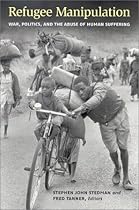Read Refugee Manipulation: War, Politics, and the Abuse of Human Suffering by Brand: Brookings Institution Press Online
Read [Brand: Brookings Institution Press Book] # Refugee Manipulation: War, Politics, and the Abuse of Human Suffering Online ! PDF eBook or Kindle ePUB free. Refugee Manipulation: War, Politics, and the Abuse of Human Suffering Midwest Book Review said A sober and clarion wake-up call. Collaboratively compiled and edited by Stephen John Stedman (Senior Research Scholar, Center for International Security and Cooperation, Stanford University) and Fred Tanner (Deputy Director for Academic Affairs, Geneva Center for Security Policy). Refugee Manipulation: War, Politics, And The Abuse Of Human Suffering is an impressive and informative collection candid essays by a variety of learned authors examining how genocidal killers

| Title | : | Refugee Manipulation: War, Politics, and the Abuse of Human Suffering |
| Author | : | |
| Rating | : | 4.39 (991 Votes) |
| Asin | : | 0815780915 |
| Format Type | : | paperback |
| Number of Pages | : | 202 Pages |
| Publish Date | : | 2017-05-31 |
| Language | : | English |
Midwest Book Review said A sober and clarion wake-up call. Collaboratively compiled and edited by Stephen John Stedman (Senior Research Scholar, Center for International Security and Cooperation, Stanford University) and Fred Tanner (Deputy Director for Academic Affairs, Geneva Center for Security Policy). Refugee Manipulation: War, Politics, And The Abuse Of Human Suffering is an impressive and informative collection candid essays by a variety of learned authors examining how genocidal killers use refugee camps to their own ends, hiding among the refugees, terrorizing the refugees, recruiting from the refugee camp ranks, and siphoning off resources that inte
"the editors offer an informed and articulated set of policy options, underpinned by solid case study evidence. The book will be useful to policy makers in both the security and humanitarian industries, and its practical and clearly written style is recommended for academic audiences." —Karen Jacobsen, Tufts University, The International Journal of African Historical Studies"A commendable examination of the problems of refugee relief, and the abuses that can arise.We need studies like this to remind us of the pitfalls that accompany good intentions and knee-jerk reactions to crises. One hopes that a copy will accompany every relief team that ventures forth." —Sol Schindler, The Washington Times, 9/9/2003"the book by Stedman and Tanner is a thorough examination of three of the great refugee movements in recent history: those in Afghanistan, Cambodia, and Rwanda." —Herb Thompson, The
He recently served as the research director of the United Nations High Level Panel on Threats, Challenges, and Change and as assistant secretary-general and special advisor to the secretary-general of the United Nations. Stephen John Stedman is a senior fellow at the Center for International Security and Cooperation at Stanford University and a nonresident senior fellow at the Brookings Institution. Fred Tanner is deputy director for Academic Affairs
In the post-Cold War era the United Nations and its members have chosen to treat the issue as a humanitarian problem instead of a security problem. The contributors examine three cases: Cambodian refugees along the Thai border in the 1970s and 1980s, Afghan refugees in Pakistan in the 1980s and 1990s, and Rwandan refugees in Eastern Zaire from 1994–96. Focusing on the geopolitical security environment surrounding militarized camps and the response of humanitarian agencies, the contributors to this volume examine the ways armed groups manipulate refugees and how and why international actors assist their manipulation. Manipulation is allowed to occur because the international refugee regime and major states have not identified a consistent approach to stopping it. Some armies in civil wars, facing military defeat, use refugees as assets to establish the international legitimacy of their cause, treat refugee camps as sanctuaries and recruitment pools, and limit access to refugees to ensure that they will not repatriate. They then offer suggestions for reducing the ability of such groups to use the suffering of refugees to their own advantage. As the contributors make clear, however, manipulation of refugees has important ramifications for international security, turning some civil
Download Refugee Manipulation: War, Politics, and the Abuse of Human Suffering
Download as PDF : Click Here
Download as DOC : Click Here
Download as RTF : Click Here
